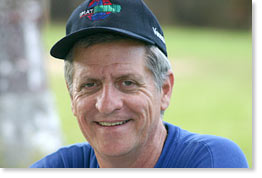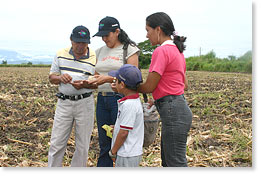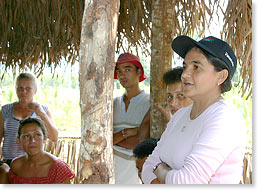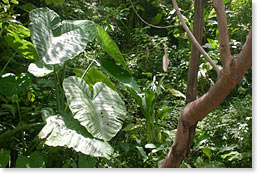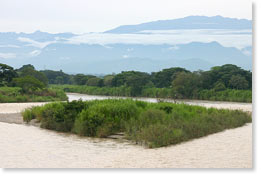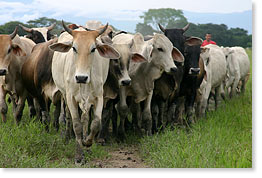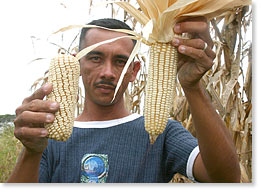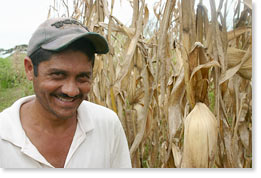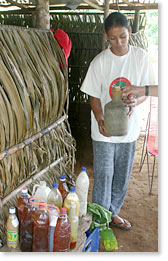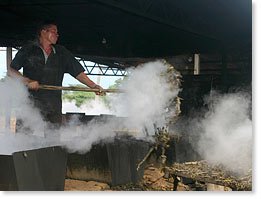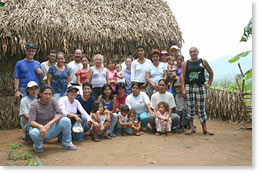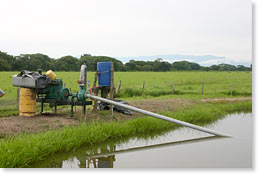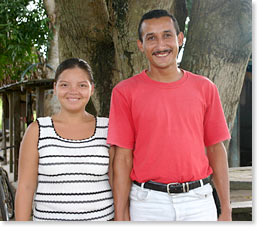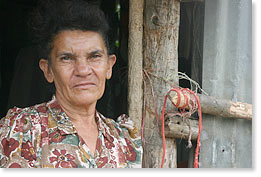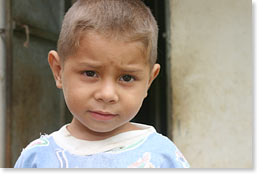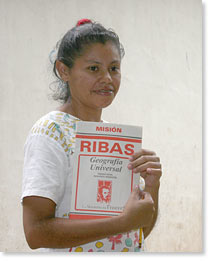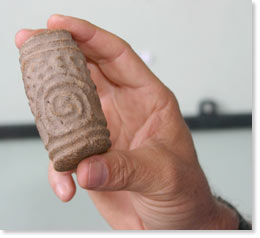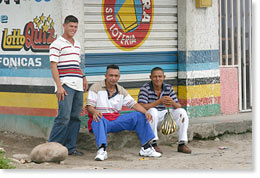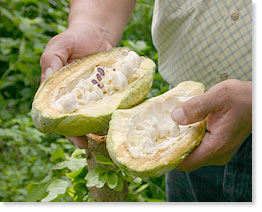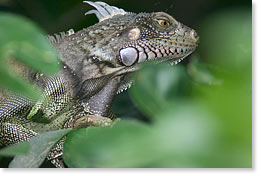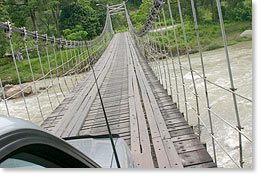|
Interview with Miguel Angel Nuñez
Farmers are Demanding Agroecology: Making Democracy Participative Barinas and Caracas, Venezuela
In Motion Magazine: What does IPIAT do? Miguel Angel Nuñez: IPIAT promotes agroecology issues in Venezuela In Motion Magazine: How do you define agroecology? Miguel Angel Nuñez: We get knowledge from farmers. We evaluate knowledge from farmers. We integrate it into the scientific knowledge of agriculture, not to damage the environment. Agroecology takes into consideration the socio-economic perspective and the technical perspective in the design, the management, the evolution of the productive system and its social, cultural, existence basis. In Motion Magazine: How do you do promote agroecology in Venezuela? Miguel Angel Nuñez: One thing IPIAT does is we are putting some propositions on the table to discuss, to evaluate, to put in practice. We have been giving ideas to the Misión Vuelvan Caras. For example, the project "All Hands to the Seeds", "Endogenous Nucleus Development", the “National Seeds Program”, and the “National Soil Recovery Program”. Secondly, IPIAT organizes production-related projects. For example, we are dealing with soil recovery, watershed management, and agroecological seed production. And, our third main program is training and extension. We have short courses on agroecology management, poly-crops, biological control, participatory methodology, artisan work. We have one training course that is very important. It is the agroecological, techno-political course. We teach this once a year. It is a high level course where we take issues related to politics, related to transnational companies, related to biodiversity, related to democracy, related to how we are able to approach political issues on agriculture. So, to sum up: we have the promotion of political agroecology; we have projects that we call productive and research projects, like you saw yesterday; and we have the training program. Agroecology vs. multinational corporations In Motion Magazine: How is agroecology different from the agricultural approach of the multinational corporations? Miguel Angel Nuñez: There is a huge difference between the multinational approach and the agroecological approach because, for example, the multinational approach is always willing to produce in large scale. Multinational production pushes for the money crops, the mono-crop culture, while agroecology is pulling for poly-crops, diversifiying production. The multinational approach uses transgenic GMO food; agroecology relies on a genetic evolution -- not transgenic. The multinational approach involves the highest expenditure of energy while the agroecological approach reduces, by at least 200 percent, energy use, energy input in the productive system. The agroecological approach is to be small, better organized, multifunctional. In Motion Magazine: Did the Green Revolution come to Venezuela? Miguel Angel Nuñez: Sure. Sure. In Motion Magazine: What was the impact? Miguel Angel Nuñez: A very negative impact. The Green Revolution didn't take into consideration all of the agroecological factors that you have to take into consideration when you are approaching productive activity. For example, the Green Revolution hasn't take into consideration the different agroecological levels that we have in the tropics. If we drive up to the Andean mountains, we can find six, seven different types of agroecological levels going from zero meters above sea level up to 5,000 meters above sea level. Here, the Green Revolution doesn't work because the Green Revolution just gives a recipe that you are to put into effect. You are supposed to work in this way in the field, with that crop, and so on. Here, with IPIAT, we are working with diversity. We have different types of productive systems in each different agroecological level. This is a very big difference between the Green Revolution and agroecology. Also, agroecology takes into consideration the cultural values, the social, cultural, and religious values of the people. The Green Revolution doesn't take that into consideration. Agriculture from the Green Revolution has been a failure because they are putting into use techniques that don't work in these agroecological conditions. The first mistake that most of these governments in Latin America and many developing countries make is imitation. They try to copy technological models and try to put them in use regardless of the environment and social cost. For example: many irrigation systems are out of order, while others consume too much water, not delivering with the actual amount of water that the plants need. This causes soil erosion in the Andean plain. Another dramatic example are the seeds which are coupled with fertilizers and agrochemicals. This is critical for us because in Venezuela we have to import the seeds that we are going to grow. In other words we depend upon Monsanto and Pioneer. This season many corn and potato framers lost their harvest because of seed diseases and germination problems. And that one is pretty bad because the farmers are highly de-motivated. On the other hand, you have seen during these days you have been here that many people are participating. Many are doing things on their own, working with their own resources, working with the resources that they find in their community -- while the Green Revolution needs inputs from outside the community and the main input from outside the community is the agro-chemicals. The agro-chemicals have definitely damaged the soil, the water, people, health, etc., etc. From the Green Revolution to transgenics In Motion Magazine: When was the Green Revolution here? Miguel Angel Nuñez: The Green Revolution started really hard back in the middle of the '50s -- '56, '57. In Motion Magazine: And went on until when? Miguel Angel Nuñez: It keeps going. This is a good question because in Venezuela it is really easy to prove how the Green Revolution failed. For example, we have to import 86% of the food that we eat. This is very dangerous for food security and food sovereignty. 86 per cent of the food that we eat we are importing. There are three major groups of foods, cereals, fatty foods, and sugar, and in Venezuelan society, 75%, from the energy point of view, belong in these three foods and are imported. This is very dangerous for a country. It doesn't have food production. This is a reason why we think that this is a very good opportunity to introduce agroecology ideas in the field -- in order that we can avoid the different types of problems that the Green Revolution gave to us. To start to have a truly new model of agriculture based on the agroecological factors that we have in tropical countries. In Motion Magazine: Who provided the resources for the Green Revolution? Miguel Angel Nuñez: Mainly governments. Also the transnational companies. In Motion Magazine: Like who? Miguel Angel Nuñez: Monsanto, AgroEvo, Syngenta, DuPont, Shell, Exxon, Phillips. Many companies are related with the oil transnationals. Tropical countries means diversity and we have a lot of agro-biodiversity and that agro-biodiversity is being called by the transnationals "green gold" -- like the transnationals call oil "black gold". Behind their talk of “biodiversity” and the “ the tropics”, the transnationals are searching for our green genes.
Miguel Angel Nuñez: There is very substantive scientific opinion about the assault and the consequence that GMO products could have on our health, on our soil, on our plants. We should be aware and we should start many activities to sensitize the people, students, farmers, everyone, about the risks of introducing into the agriculture of any country transgenic food, transgenic seeds. All of the ministries that have to deal with economy, that have to deal with developing the rural areas, that have to deal with agriculture, that have to deal with science and technology, know that many people, as President Chavez is, are against the introduction, the commercialization, the distribution, the traffic of transgenic food in our country. From the constitutional point of view, you can't work with transgenic food because if you work with transgenic food you are violating articles 301, 305, 306, 307 - all of the articles and all of the principles of a sustainable agriculture that are defined in our constitution. I believe that other countries, like the many African presidents, who say no to the transgenics are saying no to the transnational corporations that are doing research, that are doing so much production, and so much selling of transgenic seeds and the technological model that is behind transgenic food. In Motion Magazine: You say that a lot of the land, particularly in Barinas, is contaminated. What do you mean? How did it get contaminated? Miguel Angel Nuñez: There are several types of contamination of the land. One contamination is related to the agro-chemicals, pesticides, herbicides, fertilizers which are used in pretty bad ways, in a very irrational way. These chemicals have contaminated the soil and, down through the soil, the water systems, and other natural resources. And, besides the contamination of the water, we are losing biodiversity. We are creating erosion in the soil because the soil has lost its biostructure. Losing the biostructure means losing the microorgansims of the soil. The microorganisms help to grow the soil, to create equilibrium between water and air in order that the soil can breathe. Agro-chemicals don't let the soil be alive. In Motion Magazine: You were saying that one of the goals of agroecology is to decontaminate the soil. How does it do that? Miguel Angel Nuñez: When you start to work with agroecology, you start to make soil. How do you make soil? You make soil by having the right mixture of soil types and putting in organic matter. The organic matter has a lot of microorganisms. You have to feed the microorganisms. You have to put in food for the microorganisms in order that they can grow and be able to reproduce. As soon as the microorganisms are reproducing, and that reproduction is accomplished, that productive cycle, that complete cycle, you are making soil. You are making what we call the biostructure of the soil, which is a complex of different types of soil, sand, clay, with a mix of microorganisms, mixed with organic matter. They make the biostructure. The biostructure is between zero and ten, fourteen, eighteen centimeters in the main layer of the soil. This is the soil that we want to have. We want to keep the biostructure of the soil. And it is really simple to understand that one. If you kill the microorganisms you won't be able to work with agroecology. More possibility that the people participate In Motion Magazine: The process of agroecology, what does that mean for the daily lives of the farmers that are participating in the process? Does it make it easier for the farmer? Miguel Angel Nuñez: From the agroecological perspective, you will have a lot of opportunities to raise, to increase their quality of life because the agroecological activity will give the possibility to make together several activities in the fields, several activities in the productive system. As you saw, IPIAT has several agroecological field innovations, techniques, which make our farmers proud. Mono-crops, the Green Revolution with large-scale production, with bigger machines, with airplanes spraying fertilizer and spraying pesticides, gives employment to a few people. But with agroecological methods you have work for more people because you have to take more care in the work that you are doing in the field. The agroecological perspective will help you give to the community more productive activity, more possibility that the people participate, more possibility that the people will link to other issues, and other problems, and other situations that are in the community. You will learn how to participate working collectively, working in a group, working together. And that one is community health. When I am talking about health, that one means, as you saw today, that those people who are extremely poor rural people, who never get together and never in their lives do they talk between neighbors in the morning, between the women, between the families, they say, "We never had the opportunity, we never have the chance to be involved with other people." That one is friendship. That one is dignity. That one is a very high quality relationship in which you are able to relate with your neighbor and share the process, the problems. Share their victories. It is very meaningful, agroecology. Agroecology helps you to reinforce your principles, to reinforce your ideological values, your political values. Agroecology helps you to be more secure about what you want to do in your life. What do you want to be in your life and how you can have the opportunity to give to your family, to give to your son, your daughter, your other relatives, your other friends, possibilities to become a better person. In Motion Magazine: What about the economic situation? Miguel Angel Nuñez: The economic situation also is approached from the agroecological point of view. You will have in an agroecological system some gains in the process of the productive system when you stabilize, when you have equilibrium, in your growing process. You will start to gain money. You will start to raise your quality of your life from the economics point of view. But you have to take into consideration that besides the social issues and besides the economic issues, agroecology has an advantage in that when we are working with the Green Revolution we are damaging the environment, and damaging the environment has a cost which we call an external cost, due to the environmental activities -- in agroecology that cost is minimal, that cost is nothing. You have to take into consideration that in the future, when we define a new type of economy, agroecological activity will give you the chance not to contaminate the soil, the water. In Motion Magazine: You started IPIAT in '89, which was before the Chavez period. What sort of an impact has the Chavez government had on your ability to spread these ideas, to use them, to pursue agroecological techniques? Miguel Angel Nuñez: There have been some changes and I will summarize those changes -- directly, with the participation of the people. In the last government, we didn't have so much opportunity to participate and the Green Revolution made so much work in which the people didn't participate. Small farmers especially. The solution of the big farmer In Motion Magazine: Who was the president of the last government? Miguel Angel Nuñez: Rafael Caldera. But all of the presidents from the representative democracy didn't want to give opportunity to the small farmer. As in other Latin American countries, we didn't have policies for the small farmer. And that one is a very big historical mistake that we made as a profession, as technicians. When we went to university, we studied and we learned to solve agricultural problems for the big, large-scale production systems. And in universities, they teach us to solve the problem of the small farmer with the solution of the biggest farmer. We missed the conceptualization of the technology because the technology for the big farmer was used completely as the technology for the small farmer. All of the governments started to pull for that aspect, trying to solve the problem of the small farmer with the solution of the big farmer. What happened with the change of government? OK, I would say you have several Chavez ministries that don't understand yet that situation. They keep thinking that the solution for the small farmer is in the solution of the big farmers. What happened was that, beside that contradiction, people are coming from the bottom to the top participating, making democracy really participative. The people, very slowly, are demanding agroecological techniques for the small farmer. Farmers are demanding agroecology That one means the Misión Vuelvan Caras. Misión Vuelvan Caras is 600,000 farmers who don't need more agro-chemicals. There are some ministries, some institutions that are putting agro-chemicals into Misión Vuelvan Caras but there are some farmers who are demanding agroecology. Why are these farmers demanding agroecology? Because they are involved in a participatory process. The participatory process that they are gaining is giving to them the possibility to get knowledge about agroecology and they are making the difference. "I will choose agroecology rather than agrochemicals because it is less expensive and we don't get the dependency of the agro-chemical technique." In the Chavez government, and this is a fight that we have right now, we are pushing at different types of knowledge level - universities, fields, rural people, different types of forums, in different places. We are moving in any way to agroecology. In the past, it was very difficult for us to move agroecology because all of the doors were closed. "They are radical people." "They are communist people." "They are extremist people." We are so "radical" we don't want to work with agro-chemicals. Now, the people are realizing they need agroecology. Due to the participatory process. The participatory process gives them the possibility to have knowledge about what they want to do. That is the big difference. And you will see all around in Venezuela many people talking, many people participating, many people making noise, many people discussing. Many people are trying to solve contradictions. Many people looking to be participating, looking to be talking, looking to be learning. This is a change. This is one of the main changes in this revolutionary process. I have to clarify, though, that we haven't got any help from the Chavez government, from the Venezuelan government. We are expecting and we are wanting and we will be really glad to have some help to be able to advance more in agroecology. Because why? Because we deserve that one. We deserve to be working in agroecology and moving good ideas towards a better agriculture. In that way, we are convinced that we are helping the revolutionary process in the field, in the rural areas, in changing the food systems. To me, it’s part of the revolution. In Motion Magazine: Can you describe the Misión Vuelvan Caras and how it relates to agriculture and farmers? (Editor: The Hugo Chavez administration has initiated several "Missions" or campaigns among the poorest of the Venezuelan population to involve large numbers of people in addressing various social issues, such as education, agriculture, and healthcare.) Miguel Angel Nuñez: The Vuelvan Caras Misión has as its mission to work to overcome the social exclusion of the Venezuelan society, especially among the poor. The mission has five areas of work. One is agriculture that is getting together 600,000 farmers. Another one is rural industry, which involves close to two thousand. Another one is tourism that is taking in around 150,000. Another is service, which is taking another thousand. And, lastly, is infrastructure that involves another 100,000. A new type of labor relationship / an alternative economy Vuelvan Caras Misión has the mission to create a new type of employment in the revolutionary process. A new type of employment means a new type of labor relationship, which implies that we have to evaluate the productive system and we have to see what are the things that we have to change in the productive system. Vuelvan Caras Misión has the mission to work in the approach of the social economy. Social economy is really well defined in our constitution. When we are talking about social economy we believe that we have the chance to create a new type of economic relationship where you have a different type of job, where you have different level of job, where you have different types of relationship and interrelationship. Social economics mean that everyone should know about economics, and everyone should give some opinion, should talk about economics. The economic topic in society has the characteristic of "The economists are right" and are the people that can talk about economics. But why not the normal people? Why not an engineer? Why not a medical doctor? Why not a technician? Why can't a farmer talk about economics? When we are talking about social economy, we are talking about an alternative economy, an economy that is going away from the neoliberalization economy and the theory that is behind the classic economy. When we are talking about social economy, we are talking about the popular economy that is coming from the bottom to the top -- related to the labor relationship and the relationships that are between them. When we are talking about social economy, it means that we have to get together different types of people’s work, different types of alternative jobs, different types of working activity that will help to preserve the environment and help you to understand the dynamics of the new society that we need to create. Social economy: economy and ecology When we are talking about a social economy, we are saying that the social economy has one big mission, that is close to the Vuelvan Caras mission, that is to overcome social exclusion and also to avoid the degradation of the environment. When we are talking about economics and we are talking about ecology, ecology means taking care of your house, taking care of your home, and economy means good administration of your home, good administration of your house, good administration of your cooperative. Economy and ecology are involved together and that one for us is social economy too.
Social economy is a new development, a new concept of development, like I say -- the nucleus endogenous development concept, which means that you have to take into consideration your natural resources. You have to take into consideration your limitations. You have to take into consideration your potential. You have to take into consideration your ability to be negotiated, to lobby, to try to make a good transaction. Nucleus endogenous development is development that is inside the community, for the community, and to the community, using the resources of the community. That one is the true concept of the social economy. And besides that you have to manage two liberty concepts, two freedom concepts. One is to preserve the environment, don't degrade the environment. If you degrade the environment you are not administering your home very well. And when we are talking about managing, administering your home, we are talking about your home, your community, your county, your state, your country, your continent, the whole earth. The whole earth means that we want to preserve the earth for the generations that are coming. We have a debt with the generations that coming. What are we doing with that debt? What kind of humanity concept are we facing in that process? So -- social economics is ecology economics because we want to preserve the environment, we want to preserve the earth. And the other freedom concept that is very important is freedom in a political system that allows you to participate. To overcome your fear. To overcome being scared and to express your demands. Express your feelings. Express what you think. In that aspect, I would say that the Venezuelan revolution is a revolution for the Venezuelan, to the Venezuelan, and we are demonstrating a very highly qualified example of participatory democracy, direct democracy. In Motion Magazine: What is the translation of Vuelvan Caras? Miguel Angel Nuñez: In one of the important battles for our independence, a patriotic call to defeat the Spanish enemy was “Vuelvan Caras”, "Back to the battle!" "Vuelvan" is "go". "Cara' is "face'. When you are advancing on a horse and you are being beaten by the enemy, and you are the boss, you say "Vuelvan Caras!” "Go back and face it!" You turn your face. You turn your horse and start moving. Keep very close to the constitution In Motion Magazine: As an advisor to the president what do you do? Miguel Angel Nuñez: As an advisor to President Chavez I have many things to say to him. One thing is, "Keep very close to the constitution." "Keep close to the constitution" means that we need to improve more our participation. He needs to listen to what is behind many Venezuelan people. We are a very rich-in-knowledge-country people due to our biodiversity and our cultural diversity. President Chavez needs, through the constitution, needs to listen to people that have fresh ideas, new ideas, very friendly ideas, very smart ideas, very clear ideas about what we could do with our country, with the constitution, and with the development of the country. I am for applying the meaning of endogenous nucleus development but we have to talk more and go more deeply into the type of technology that we are going to use in the future. I know he is a man that is highly sensitive to these issues. In Motion Magazine: As the international representative for IPIAT, what do you see going on in other parts of the world, as far as people working on sustainable development? Miguel Angel Nuñez: I could talk the whole day about that question. But I can summarize it. I believe, I am convinced, that due to the many experiences that are all around the world, in Latin America, and Africa, and Asia another world is possible. I am trying to say, to repeat, what came out from the Porto Alegre meeting two years ago. That is: another world is possible due to the fact that there are many experiences in the social movement all around the world. They are showing you very well, and precisely, an alternative to work it out in this society. We have many experiences, many movements, many actions, many alternative possibilities that are showing to you, "In society, another world is possible." From my international perspective, we have to make an effort to make bridges, south to south, north-south, because those bridges between NGOs, farmers, will give so much strength, so much dignity, so much happiness, so much possibility that you can realize that the thing that you are doing is the right thing. For example, I feel very proud about the job that I am doing. I am working for agroecology on principle. We have not got any money from the government. Though we are asking to have money because we believe that this government is a revolutionary government and is really interested to move many things towards agroecology. I think that agroecology in Venezuela can have a political push, perhaps in the future be a political movement. I must confess to you that I feel proud about the agroeoclogical work that IPIAT’s people are doing. I feel with a lot of dignity and I deserve that dignity. I am working for other people. I am working in a very open and very wide way convinced that the thing that I am doing is the thing that I have to do. In the international arena, we have the opportunity to find people that have the same feeling, that have the same thinking, because we have the same problems with a natural variety of the problems. In the end, we have the same problems. Exchange ideas, seeds, technology, friendship So, if you don't get linked and you don't exchange ideas, seeds, technology, friendship ,you will be getting weakness. We have to practice international solidarity with other peoples, other movements, other social movements, other agroecological movements, agroecological networks. And all that means alternative. When we are talking about alternative, we are talking about “another world is possible”. We are learning from the social international movement that that way is possible. How sustainable, practicable society is linked with democracy In Motion Magazine:Do you see a direct relationship between discovering how to do sustainable development and building a democracy? Miguel Angel Nuñez: Sure. Directly. You know why? Sustainable development means that you need to develop the participatory process and democracy. The new democracy that we are working here in Venezuela is participatory and I can give you an example. Action, the more qualified action in participatory democracy, is the social control by the people of public policies. This is very important what I am trying to say here. When we are talking about public policy, I am talking about how the population, how the people are looking, are asking questions, are evaluating. "What is my county doing?" "What is the possibility that we can evaluate and give some opinions?" "What type of political power are we trying to build?" What is going on at the municipality level? The moment when the society has the highest knowledge about sustainable practice they are going to demand to have in their community sustainable practices and politics are going to be changing. There will be another type of political relationship between the community and the political movements. Raise your knowledge Participatory democracy means raise your knowledge about what kind of society we need to have. What kind of society we need for our kids, for the generation that is coming. When we are talking about that one and we talking about public policies, we have to talk about the social control of public policy, and in the social control of public policy the question is "What kind of sustainable activities we are doing in the community?" "What kind of sustainable project do we have?" To me, it is of very high importance to try and understand that one. How sustainable practices, sustainable practical society is linked with a democracy. Representative democracy is against sustainable practice because the representative democracy is trying to do the sustainable practice for the people, and the people want to participate in that type of policy. They want to give opinions. They want to know what you are doing in the community. They want to know how you are spending in the community. They want to know what are going to be the benefits directed to the community. They want to know how are you going to be sharing the advantage, sharing the gains, in the community. They want to know how they could be able to preserve that type of relationship in the democracy. If you preserve a good, sane, healthy, social relationship in the community, you will be able to find sustainable practices. There is no question about it. Participatory democracy is demanding to get married with sustainable practices. Published in In Motion Magazine November 16, 2004 Also see:
|
||||||||||||||||||||||||||||||||||||||||||||||||||||||||||||||||||||||||||||||||||||||||
If you have any thoughts on this or would like to contribute to an ongoing discussion in the  What is New? || Affirmative Action || Art Changes || Autonomy: Chiapas - California || Community Images || Education Rights || E-mail, Opinions and Discussion || En español || Essays from Ireland || Global Eyes || Healthcare || Human Rights/Civil Rights || Piri Thomas || Photo of the Week || QA: Interviews || Region || Rural America || Search || Donate || To be notified of new articles || Survey || In Motion Magazine's Store || In Motion Magazine Staff || In Unity Book of Photos || Links Around The World NPC Productions Copyright © 1995-2018 NPC Productions as a compilation. All Rights Reserved. |


